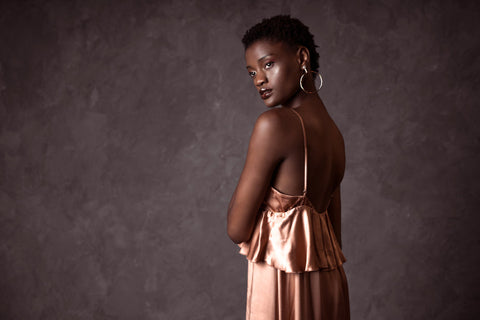Makeup can be frustrating and frustrating. It can also cause itchy, red and uncomfortable skin. This can be very disheartening.
If you’re one of them, you might be wondering if you should stop wearing makeup altogether. The good news is that there is another solution. Have you ever tried using hypoallergenic makeup?
EpiLynx is dedicated to developing and manufacturing a line of cruelty-free and gluten-free makeup and skin care products. All are also hypoallergenic. EpiLynx by Dr. Liia is dedicated to providing scientifically formulated skincare and makeup for people with sensitive or acne-prone skin types.
With special emphasis on celiac disease and autoimmune diseases. EpiLynx products are made with the highest science and medically pure ingredients. The goal is to leave the skin moisturized and hydrated and reduce the risk of irritation.
What is hypoallergenic makeup?
Hypoallergenic is a term not regulated by the FDA, but usually refers to makeup that does not contain common allergens. This includes fragrances, dyes and parabens, phthalates, forever chemicals and more.
Hypoallergenic eye makeup and hypoallergenic foundation are two first products to start when making the transition to using hypoallergenic makeup.
Many non-hypoallergenic foundations and eye makeup products contain artificial fragrances and fragrances. They can lead to itching, redness, dry skin and even allergic reactions. Always look for products that are gluten-free, wheat-germ-free, rye-free and barley-free.
Look for the term “hypoallergenic” on packaging that is certified and tested by a reputable laboratory. Cross contamination can also be a problem.
Always read the ingredient list
The best way to tell if you’re choosing cosmetics that won’t irritate your skin is to understand the ingredients. The best rule of thumb is, the fewer ingredients, the lower the risk of reaction.
Of course, keep in mind that what might be annoying to one person could be perfectly fine to another. However, if you have sensitive skin, you should always look for gluten-free makeup brands. Preferably, those that have been tested and certified gluten-free.
Essential or natural oils can often lead to sensitivity, so if you have a compromised skin barrier, you should avoid them. Natural oils don’t mean safe and better for you. Ingredients like alpha hydroxy acids and retinol are very strong and often cause irritation. So you should always perform a patch test (just below the ear) and introduce them into your routine slowly.
Parabens and phthalates, there are other preservatives commonly used in makeup that you should avoid. This includes benzyl alcohol, formaldehyde, diazolidinyl urea, propylparaben and butylparaben and many others.
Chemical sunscreens usually aren’t as good when it comes to sensitivity. So go ahead mineral sunscreen products with zinc oxide and titanium oxide.

How to choose hypoallergenic makeup brands
Many makeup experts recommend choosing neutral eye palettes. This is because they contain fewer dyes and are less likely to cause reactions. Chamomile, licorice, and alpha-bisabolol are generally considered mild and safe. Especially for people with sensitive skin, gluten sensitivity and autoimmune diseases.
How to make hypoallergenic makeup work for you
EpiLynx always recommends doing a patch test (right under your ear) before introducing a new product into your routine. Watch for ingredients that may irritate your skin to help you identify your irritations and avoid those ingredients and products.
Be sure to clean your makeup brushes regularly, as oils and makeup residue can also be sources of irritation and breakouts.

Allergies vs sensitivity
First, having a skin reaction to a makeup product does not mean you are allergic to all of the active ingredients. However, you may be allergic to one or more ingredients.
Redness, burning, stinging, peeling, dryness, allergic dermatitis or general irritation are signs that you may have a sensitivity. A true cosmetic allergy is less common and its symptoms can include swelling, hives, wheezing, and even anaphylaxis.
If you experience any of these side effects after applying a cosmetic product, discontinue use immediately and seek medical attention.
Is hypoallergenic makeup regulated by the FDA?
As it stands now, hypoallergenic makeup is not regulated by the FDA. It seems that it is actually up to the brands to develop their own standards for ingredients.
Even if it is not officially regulated, it is recommended to look for a hypoallergenic label on products.
You can also read labels for unscented and not unscented. “Unscented is a very misleading term, as it actually means that the product contains either synthetic fragrances or ‘natural oils.’
These masking fragrances could still cause an allergic reaction, while unscented is truly unscented.
Is Clean Beauty hypoallergenic?
Pure beauty is a very broad term and its meaning has changed over the years. Incorporating popular trends such as natural cosmetics, health, wellness, social, ethical and environmental responsibility are becoming what clean beauty is known for.
Clean beauty also includes non-toxic and gluten-free beauty.
Consumers are becoming more aware and concerned about the safety and effectiveness of the products they put into their bodies.
Originally starting in the food industry, clean beauty has now become a dominant concept in personal care. However, clean beauty is such a broad term and does not mean hypoallergenic.
So not every clean beauty is hypoallergenic, however every hypoallergenic beauty is usually considered clean.
